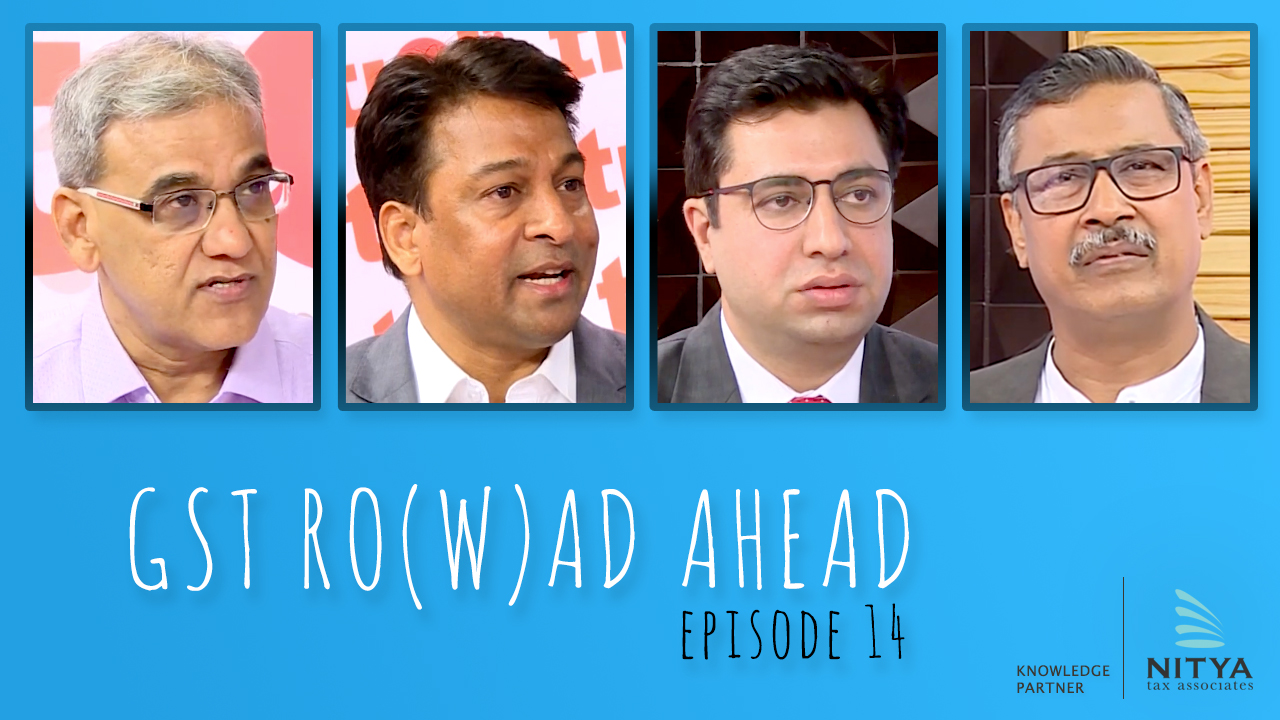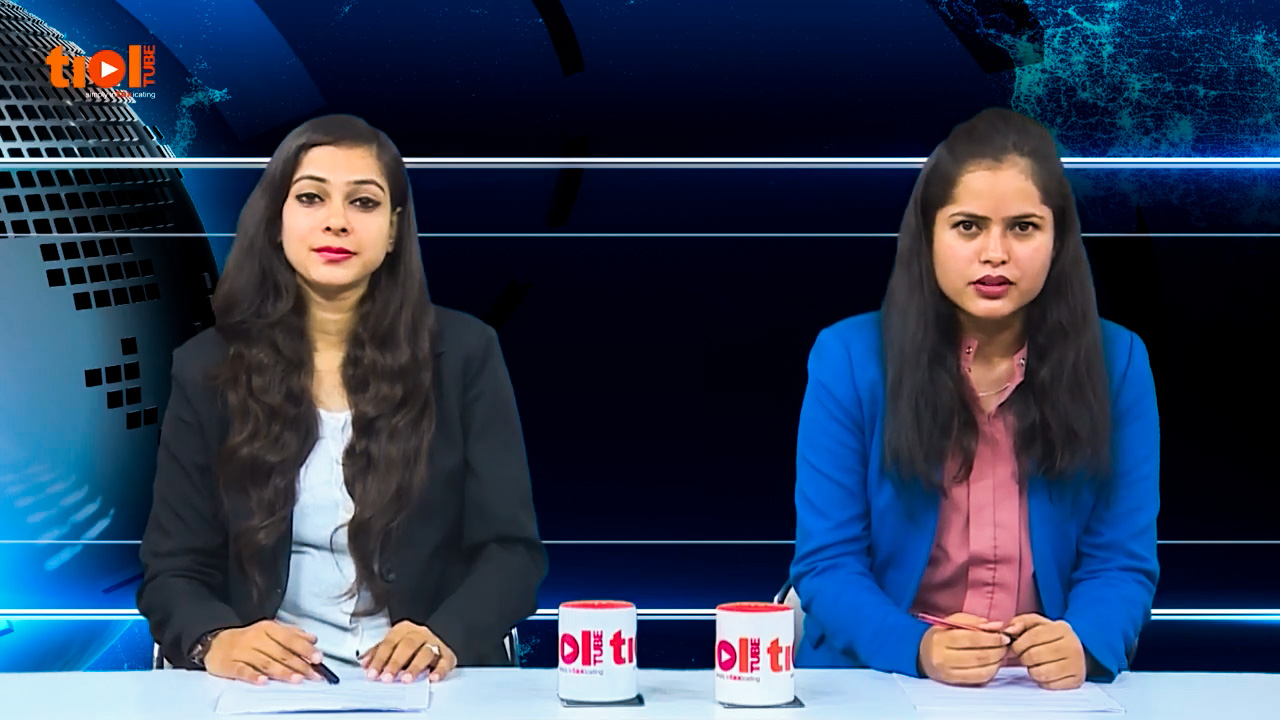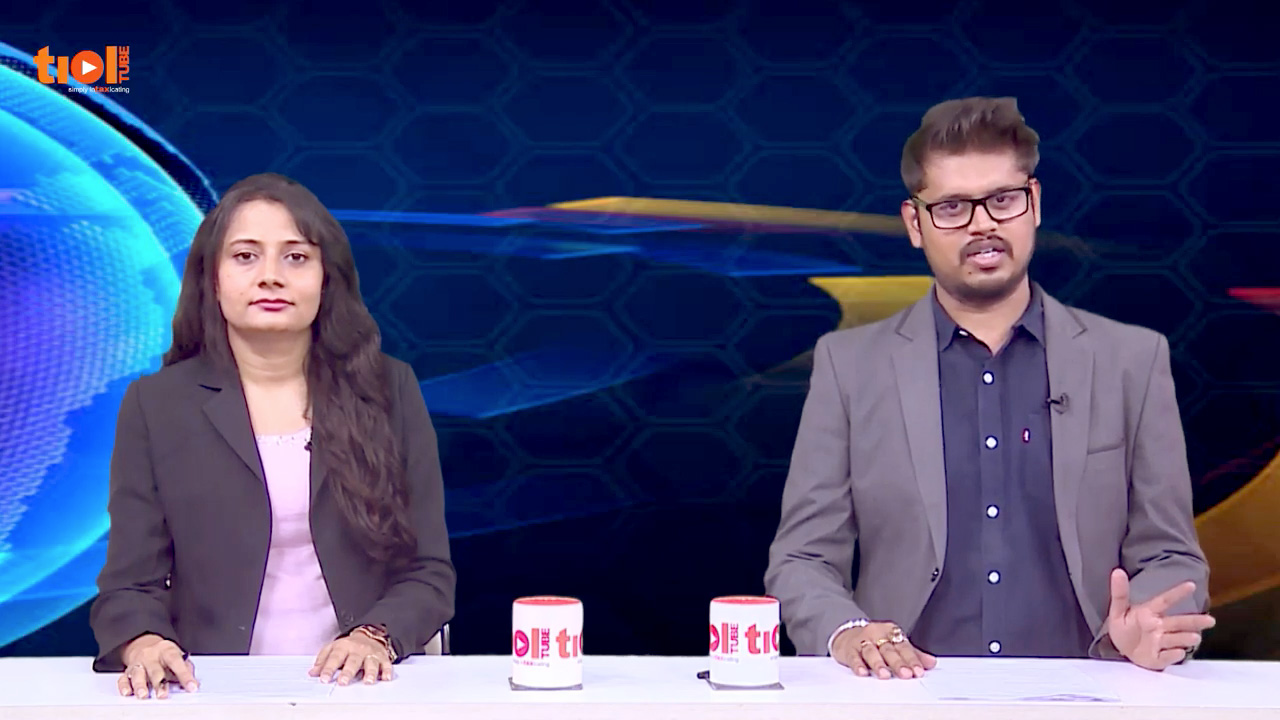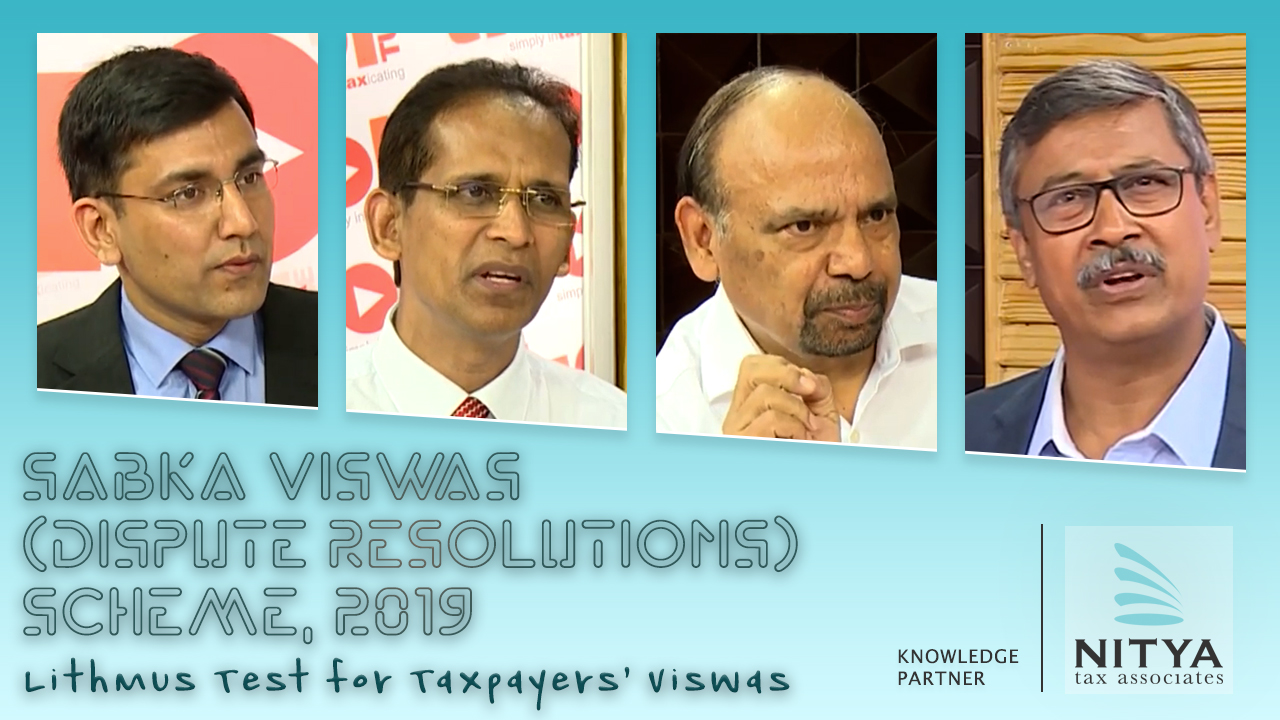|
SERVICE TAX 2019-TIOL-2771-CESTAT-MUM
Fractal Analytics Pvt Ltd Vs CCGST
ST - Appellant, engaged in providing advanced analytics services to its clients, mostly located outside the country, was not in a position to utilize the cenvat credit taken on the input services - thus, during the disputed period April 2016 to September 2016, the appellant had filed refund applications before the jurisdictional ST, claiming refund of ST paid on the input services - refund applications were rejected by the original authority on the ground that there is no nexus between the input services and output service provided by the appellant - on appeal, the Commisisoner (Appeals) upheld the views expressed by the original authority, therefore, appeal.
Held: Insofar as taking of irregular cenvat credit or non establishment of nexus between the input services and the output service is concerned, the benefit of cenvat credit can be denied by taking recourse to rule 14 of the Cenvat Credit Rules, 2004 - admittedly, in the present case, the provisions of rule 14 ibid have not been invoked by the department - since the appellant has complied with the requirement of rule 5 ibid by adopting the formula prescribed in the said rule, the refund claims were filed before the department, denial of the refund benefit on the sole ground of non-establishment of nexus cannot be considered as justifiable reason for such denial - it is found that the case laws relied upon by the appellant [WNS Global Services - 2016-TIOL-1275-CESTAT-MUM and Walton Street India Real Estate - 2019-TIOL-2023-CESTAT-MUM squarely dealt with the issue in hand - therefore, no merits found in the impugned order - accordingly, by setting aside the same, the appeals are allowed in favour of the appellant : CESTAT [para 6, 7]
- Appeals allowed: MUMBAI CESTAT
2019-TIOL-2770-CESTAT-DEL
GS Developers And Contractors Pvt Ltd Vs CST
ST - The assessee is engaged in civil construction work and is registered with Service Tax Department for services of description "Commercial or Industrial Construction Services", "Construction of Complex Services" and "Works Contract Services" - For discharging the service tax under "Works Contract Services", the assessee availed the benefit of Works Contract Rules, 2007 - Four SCNs were issued to assessee - In regard to the first two SCNs, the benefit of abatement has been denied for the reason that the assessee did not include the cost of free material supplied to them in the gross amount charged for the purpose of computation of abatement and for payment of tax at wrong rate under the composition scheme in the month of March, 2008 - The Commissioner observed that there was no dispute that the contract executed by assessee involved both supply of material and provision of service and that the payment of service tax made prior to 01 June, 2007 was under "Construction of Complex Service", but, as the assessee had not included the value of "free of cost" material in the gross value for payment of service tax, it had wrongly availed the benefit of abatement notifications - This finding of the Commissioner runs contrary to the decision of Supreme Court in case of Bhayana Builders (P) Limited - 2018-TIOL-66-SC-ST - The Supreme Court observed that the value of taxable services cannot be dependent on the value of goods supplied free of cost by service recipient and such a value has no bearing on the value of services provided by the service recipient - The Commissioner, therefore, could not have denied the benefit of abatement merely for the reason that the assessee had not included the cost of free material supplied to them in the gross value of services - The third SCN deals with demand of service tax proposed on differential value calculated on comparing the gross amount as per the balance sheet and the gross amount as per ST-3 Returns - The contention of assessee is that the demand could not have been confirmed under "Commercial or Industrial Construction Service" for the reason that it was a composite contract and in the nature of "Works Contract Services" and for this submission, reliance has been placed on the decision of Supreme Court in Larsen & Toubro Ltd - 2015-TIOL-187-SC-ST - The demand could not have been confirmed under "Commercial or Industrial Construction Service" in view of said decision of Supreme Court - The fourth SCN seeks to deny cenvat credit to the assessee because the assessee had struck off column No. 5B of the ST-3 Return for the period 2010 to 2011 relating to cenvat credit taken and utilised - The contention of assessee is that they had struck off the column 5B by mistake but at the same time had also enclosed details of service tax for the period from 1 April, 2010 to 31 March, 2011 in the ST return which mentioned "less cenvat" and, therefore, the Commissioner could have examined the same - This is a factual aspect inasmuch as it has to be seen whether the enclosure was enclosed with the ST-3 returns and in any case the Commissioner has not examined the same because Column 5B had been struck off - This aspect, therefore, needs to be examined by the Commissioner - It is, therefore, considered appropriate to remand the matter to the Commissioner: CESTAT
- Appeal partly allowed: DELHI CESTAT
CENTRAL EXCISE 2019-TIOL-2769-CESTAT-MUM
ISMT Ltd Vs CCE & ST
CX - Refund - Vide impugned order, the refund application filed by the appellant was rejected, holding that the relevant date in the case of refund applications should be considered as the date of payment of duty and since the applications were filed beyond one year from such relevant date, the claim is clearly barred by limitation of time - further, it was also held that the appellants did not deposit the duty amount under protest and had also not opted for the provisional assessment - appeal to CESTAT.
Held: As per the explanation contained in section 11B of the CEA, the case of the appellant squarely falls under purview of clause (f), where under the relevant date should be construed as "the date of payment of duty" - admittedly, in this case, the appellants had filed the refund applications beyond the period of one year from the date of payment of duty attributable to exportation of goods - since the provisions of section 11B have not prescribed any specific relevant date for consideration of filing of refund claim after obtaining the proof of export of goods, the relevant date for such purpose should be governed only under clause (f) contained in the explanation appended to section 11B - since, statute clearly mandates that refund claim has to be lodged within a period of one year from the relevant date, such prescribed time limit has to be strictly adhered to by the authorities functioning under the statute - in view of the above, and the decisions in the cases of Doaba Co-operative Sugar Mills - 2002-TIOL-426-SC-CX, Anam Electrical Manufacturing Co. - 2002-TIOL-650-SC-CUS and Miles India Ltd. - 2002-TIOL-501-SC-CUS, no infirmity found in the impugned order and the same is upheld - accordingly, appeal filed by the appellant is dismissed : CESTAT [para 7, 8, 9]
- Appeal dismissed: MUMBAI CESTAT
2019-TIOL-2768-CESTAT-BANG
Khoday Glass Company Vs CCT
CX - The assessee-company manufactures Glass bottles falling under Tariff Heading 70109000 - On scrutiny of records, it emerged that the assessee cleared finished goods to various buyers - The Revenue observed that two of these buyers, namely M/s Khoday India Ltd and M/s Khoday RCA Industries, appeared to be inter-connected undertakings of the assessee - Further scrutiny of these documents related to the clearances made to these units also revealed that the assessee was clearing the finished goods on payment of duty by adopting the value u/s 4 of the CEA 1944 - As the assessee and the buyers appeared to be related, it appeared that the valuation adopted by the assessee, i.e., the transaction value u/s 4 of the CEA 1944 was inapplicable to the instant case - Hence it appeared that the two entities, being related to the assessee, should have adopted the provisions of proviso to Rule 9 r/w Rule 8 of the Central Excise Valuation (Determination of Price of Excisable Goods) Rules, 2000 for valuation purposes - Hence an SCN was issued to the assessee proposing to raise duty demands with interest & penalty - On adjudication, these demands and penalty were confirmed - Hence the present appeals.
Held - The assessee cleared goods to its sister concerns as well as to third party buyers - It is also seen that the assessee rightly followed the valuation rules and that there were sales to the other buyers in substantial proportions - The assessee gave detailed information regarding the clearances to the sister units as well as to third party independent buyers, but the Revenue did not examine those sales to the independent buyers and only considered the clearances to the sister unit and raised duty demand - Besides, the issue came to the Revenue's notice for the first time in 2002 when it recorded statements of the assessee-company's VP - However, the Revenue took no action and again recorded statements of the VP in 2007, before proceeding to issue SCN, after about a gap of 8 years from the date of its becoming aware of the issue of supplies made to sister units - Moreover, the assessee attached audit reports from two periods, wherein the audit party raised no objection to the issue of valuation and clearances made to the sister unit - The Revenue put forth no evidence alleging any suppression of facts with intent to evade payment of duty - Therefore, as the entire demand is barred by limitation, there is no need to render findings on merits: CESTAT
- Assessee's appeals allowed: BANGALORE CESTAT
CUSTOMS 2019-TIOL-441-SC-CUS
Indusind Media And Communications Ltd Vs CC
Cus - Appellant imported certain goods at Air Cargo Complex, Delhi and declared the same as Multiplexer, Satellite Receivers, test and measurement equipment etc. and attached six invoices covering 19 items imported, classified the same under Ch.84/85 of CTA - bill of entry was assessed as per declaration and applicable customs duty was paid - subsequently, information was received from SIIB ACC, Mumbai that investigations had been commenced against the appellant for import of similar goods at Mumbai - accordingly, provisional assessment was ordered u/s 18 of the Customs Act - investigation revealed that appellant importer had placed the order at UK for purchase of equipments, one set for Mumbai and another set for Delhi; that each set of equipment, taken together constituted ‘Head End' for Cable TV operations; that the complete set of equipment together merits classification under CTH 85438999 in view of Note 4 to Section XVI of CTA; that individual classification amounts to mis-declaration; that the importer had suppressed the value of embedded software as well as value of services payable to the foreign supplier for carrying out integration of the system prior to shipment and provide complete commission and installation services at the customers premises - SCN dated 27.06.2014 was issued inter alia proposing rejection of the declared values and redetermination of the same under rule 9(1)(e) [adding cost of services] of the Valuation Rules, 1988; invoice value declared in invoice of Rs.1.02 crores be enhanced to Rs.1.72 crores for the purpose of assessment u/s 14 r/w rule 9(1)(e) of the Rules and finalisation of the provisional assessment - appellant did not file any written submission and did not avail the opportunity of personal hearing granted on various dates and, therefore, the Commissioner of Customs (Imports) by his order dated 29.12.2015 rejected the declaration made by the appellant vide the Bill of Entry dated 26.06.2003 and upheld the charges levelled in the SCN, ordered confiscation/payment of redemption fine, imposed penalties etc. - In appeal, the Tribunal by order dated 09.11.2017 upheld confiscation and penalty by concluding that mis-declaration has been established in respect of valuation by relying upon sub-rule (iii) of Rule 10 of 2007 Valuation Rules but remanded the matter for purpose of recomputing the differential duty in the light of its conclusion that the classification of the imported goods was to be under heading 8525 and not under heading 8543 - appeal to Supreme Court by importer against this order.
Held: Finding of the Tribunal that the imported goods would be classifiable under Tariff Item 8525 and not under 8543 has not been challenged by the respondent - Thus insofar as issue of classification is concerned, the question is whether the items imported ought to be considered individually or whether the treatment given by the department with the aid of Note 4 to Section XVI was correct - Appellant is right in its submission that since the Bill of Entry in the present case was of the year 2003, 2007 Rules would not apply and that the appropriate rules would be 1988 Rules - Decision of the Supreme Court in Toyota Kirloskar, Essar Steel Ltd., Hindalco Industries Ltd. and in Prodelin India (P) Ltd. is that the technical assistance fees/knowhow fee in respect of post-importation activities cannot be added to the value of the imported goods - It is a matter of record that after considering the purchase order the Tribunal found that apart from supply of equipment, necessary software had to be embedded in the equipment before the supply was effected; that out of 19 items indicated in the Bill of Entry, only 8 items were physically presented while the rest were already embedded in the main unit and these facts are not only reflective that the individual components were intended to contribute together and attain a clearly defined function as dealt with in Note 4 of Section XVI but also indicate that software that was embedded through cards in the main unit was not any post-importation activity and, therefore, the value of the software and the services concerned were rightly included and taken as part of the importation - department was, therefore, right in invoking the principle under said Note 4 and considering the imported items as part of one apparatus or machine to be classifiable under the heading appropriate to the function - Rule 9(1)(b) of 1988 rules quoted in the decision in Toyota Kirloskar case shows that the value in respect of “materials, components, parts and similar items incorporated in the imported goods” has to be added while determining the transaction value - Said Rule 9 is almost identical to Rule 10 of 2007 Rules, therefore, even if the governing rule is taken to be Rule 9 of 1988 rules, there would be no difference in the ultimate analysis - no merit in appeal - Tribunal view affirmed and appeal dismissed: Supreme Court [para 14, 15, 16, 17]
- Appeal dismissed: SUPREME COURT OF INDIA
2019-TIOL-2767-CESTAT-AHM
Shree Tushar Tilak Raj Vs CC
Cus - The common issue involved in the present case is that the goods imported by assessee declaring the same as Polyester Bed Cover are whether Polyester bed cover or polyester fabric is classifiable under Custom Tariff Heading 6304 1930 as declared by assessee or under Custom Tariff Heading 5407 5490 as claimed by Revenue - The assessee has raised very important preliminary issue that the adjudicating authority instead of deciding the matter on general meaning of made ups and fabric should have decided on the basis of statutory provision as provided under Chapter Notes of Section XI of Customs Tariff as well as on the HSN Notes - In these facts, the matter needs to be reconsidered by adjudicating authority - All the issues are kept open - Since in these matters, this Tribunal had allowed the early hearing application and the matter appears to be of urgent nature, the adjudicating authority should pass a de novo adjudication order preferably within a period of 3 months : CESTAT
- Matter remanded: AHMEDABAD CESTAT
2019-TIOL-2766-CESTAT-BANG
Universal Oleoresins Vs CC
Cus - The assessee imported Light Black Pepper Berries without payment of Customs duty, having claimed exemption under Notfn No 96/2009 under DEEC Scheme Advance Authorization - As per the conditions of the Notfn, the assessee had to discharge export obligation within a period specified by the licensing authority and also produce evidence of discharge of the export obligation - While the export obligation was over, the importer failed to produce EODC and export related documents to the adjudicating authority - The assessee claimed to have approached the writ court and sought that any further proceedings be kept in abeyance - Meanwhile, the High Court dismissed the assessee's writ, on grounds that the Policy Relaxation Committee had already taken an appropriate decision - However, the High Court also directed the assessee to file objection to the SCN issued by the JDFT - Later, the adjudicating authority held the assessee liable to pay the duty foregone with interest, on account of non-fulfilment of export obligation as per Notfn No 96/2009 - Hence duty demand was raised and such findings of the O-i-O were sustained by the Commr.(A) - Hence the present appeal.
Held - The assessee produced the EODC certificate & redemption letter - This shows that the assessee fulfilled the export obligation as was required under the advance authorization - As the assessee fulfilled the export obligation, the O-i-O merits being quashed subject to the verification of the EODC certificate by the relevant authority of the DGFT: CESTAT
- Assessee's appeal allowed: BANGALORE CESTAT |
|








